Survey of ASDWA Members on Specifications of NSF/ANSI/CAN 60, 61, and 372
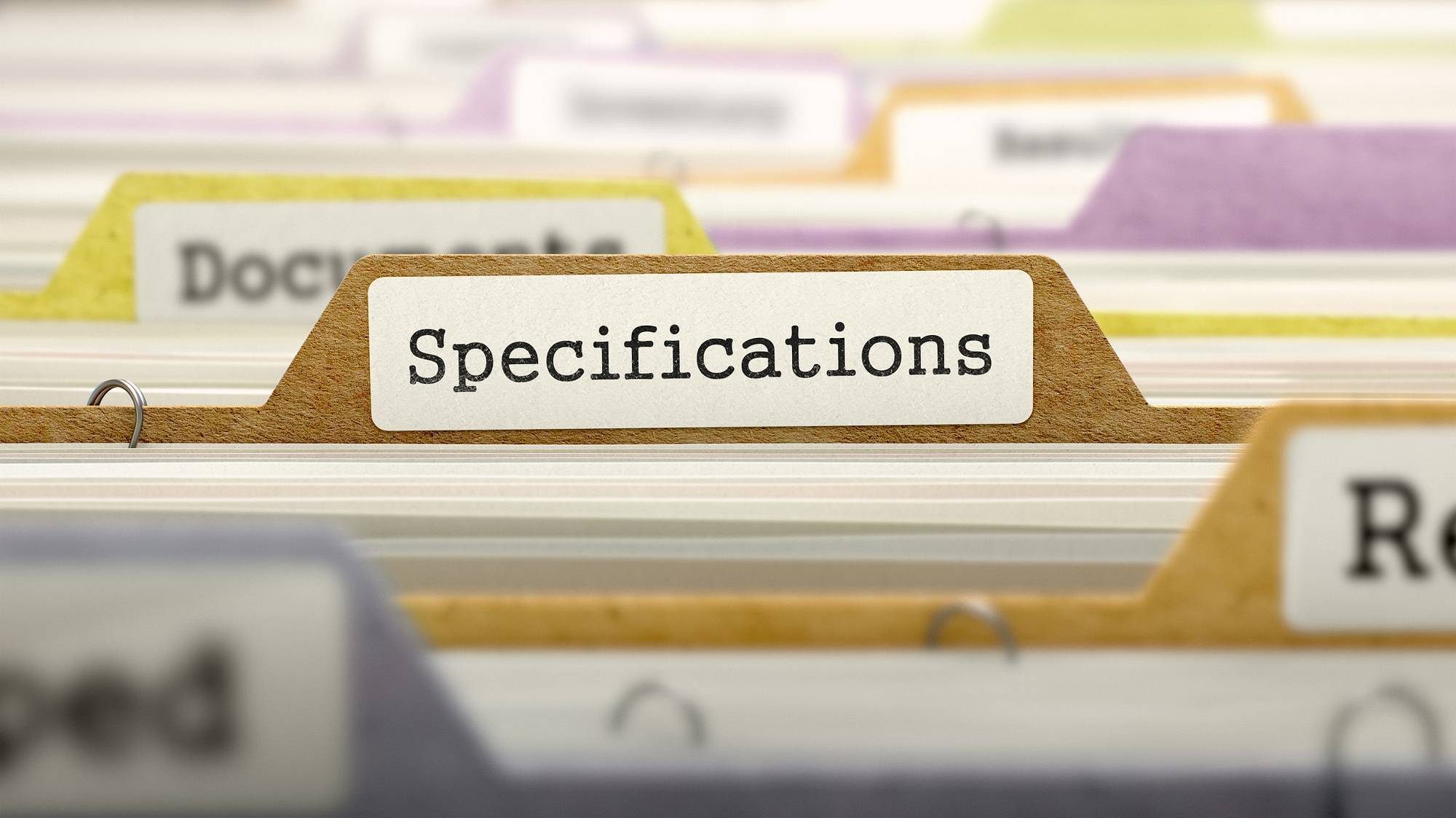
Overview
NSF, in cooperation with the Association of State Drinking Water Administrators (ASDWA), conducted a survey of U.S. and Canadian drinking water agencies about their recognition and use of the following NSF/ANSI/CAN standards:
- NSF/ANSI/CAN 60: Drinking Water Treatment Chemicals – Health Effects
- NSF/ANSI/CAN 61: Drinking Water System Components – Health Effects
- NSF/ANSI/CAN 372: Drinking Water System Components – Lead Content
Executive Summary
NSF/ANSI/CAN 60: Forty-nine states have legislation, regulations or policies requiring drinking water treatment chemicals to comply with or be certified to NSF/ANSI/CAN 60.
NSF/ANSI/CAN 61: Forty-nine states have legislation, regulations or policies requiring drinking water system components to comply with or be certified to NSF/ANSI/CAN 61.
NSF/ANSI/CAN 372: This establishes a standardized methodology for the determination and verification of product compliance with a maximum weighted average lead content requirement of 0.25%. With the exception of those products exempted in the Safe Drinking Water Act of the United States, all products certified to NSF/ANSI/CAN 61 must also be evaluated to the requirements of NSF/ANSI/CAN 372. On September 1, 2020, the U.S. Environmental Protection Agency (EPA) published the final regulation “Use of Lead Free Pipes, Fittings, Fixtures, Solder, and Flux for Drinking Water,” which requires that manufacturers or importers certify that their products meet a 0.25% weighted average lead content for products conveying or dispensing drinking water.
NSF/ANSI/CAN 60 U.S. Compliance Requirements
ASDWA members were asked about each of their state’s compliance requirements to NSF/ANSI/CAN 60: Drinking Water Treatment Chemicals – Health Effects.
The survey found that 49 states have requirements for water treatment chemicals to comply with NSF/ANSI/CAN 60, as shown below. For more specific information by state, see Addendum A toward the end of this article.
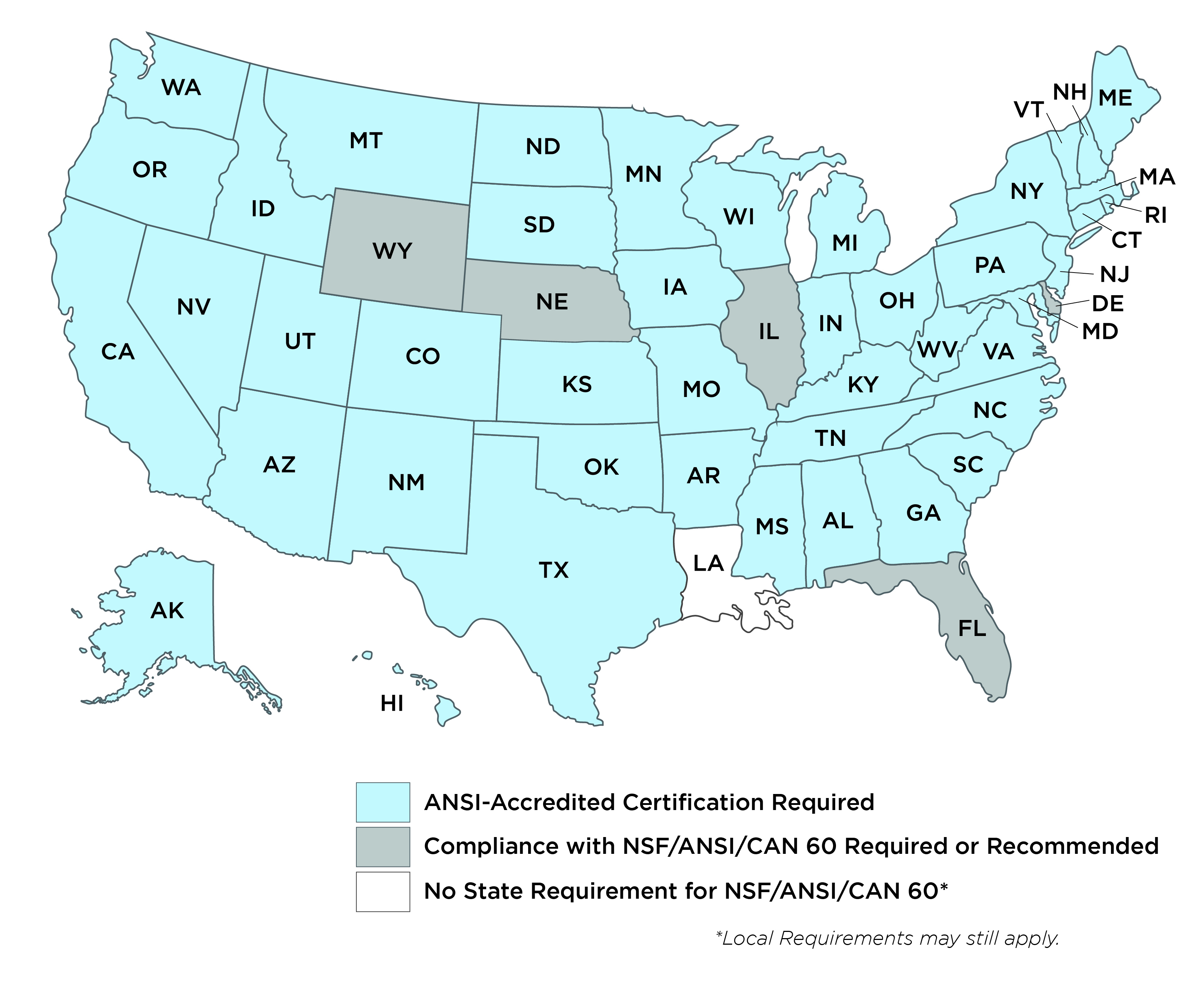
States requiring ANSI-accredited certification to NSF/ANSI/CAN 60 include: Alabama, Alaska, Arizona, Arkansas, California, Colorado, Connecticut, Georgia, Hawaii, Idaho, Indiana, Iowa, Kansas, Kentucky, Maine, Maryland, Massachusetts, Michigan, Minnesota, Mississippi, Missouri, Montana, Nevada, New Hampshire, New Jersey, New Mexico, New York, North Carolina, North Dakota, Ohio, Oklahoma, Oregon, Pennsylvania, Rhode Island, South Carolina, South Dakota, Tennessee, Texas, Utah, Vermont, Virginia, Washington, West Virginia, Wisconsin
States where compliance with NSF/ANSI/CAN 60 is required or recommended: Delaware, Florida, Illinois, Nebraska, Wyoming
No state requirement for NSF/ANSI/CAN 60 (local requirements may still apply): Louisiana
NSF/ANSI/CAN 61 U.S. Compliance Requirements
Drinking water system components fall into two categories of regulation. Centralized water treatment plants and water distribution systems up to and including the water meter are typically regulated by state drinking water agencies. Water distribution systems downstream of the water meter or inside a building are typically regulated by state or local plumbing codes. The information shown in this document applies to products regulated by state drinking water regulatory agencies only. While all major model plumbing codes require the use of NSF/ANSI/CAN 61 certified products, the specific requirements for those product types can be found in state or local plumbing codes. Products certified to NSF/ANSI/CAN 61 also comply with NSF/ANSI/CAN 372 unless specifically exempted by the Safe Drinking Water Act of the United States..
The ASDWA member survey found that 49 states have requirements for water treatment and distribution components to comply with NSF/ANSI/CAN 61.
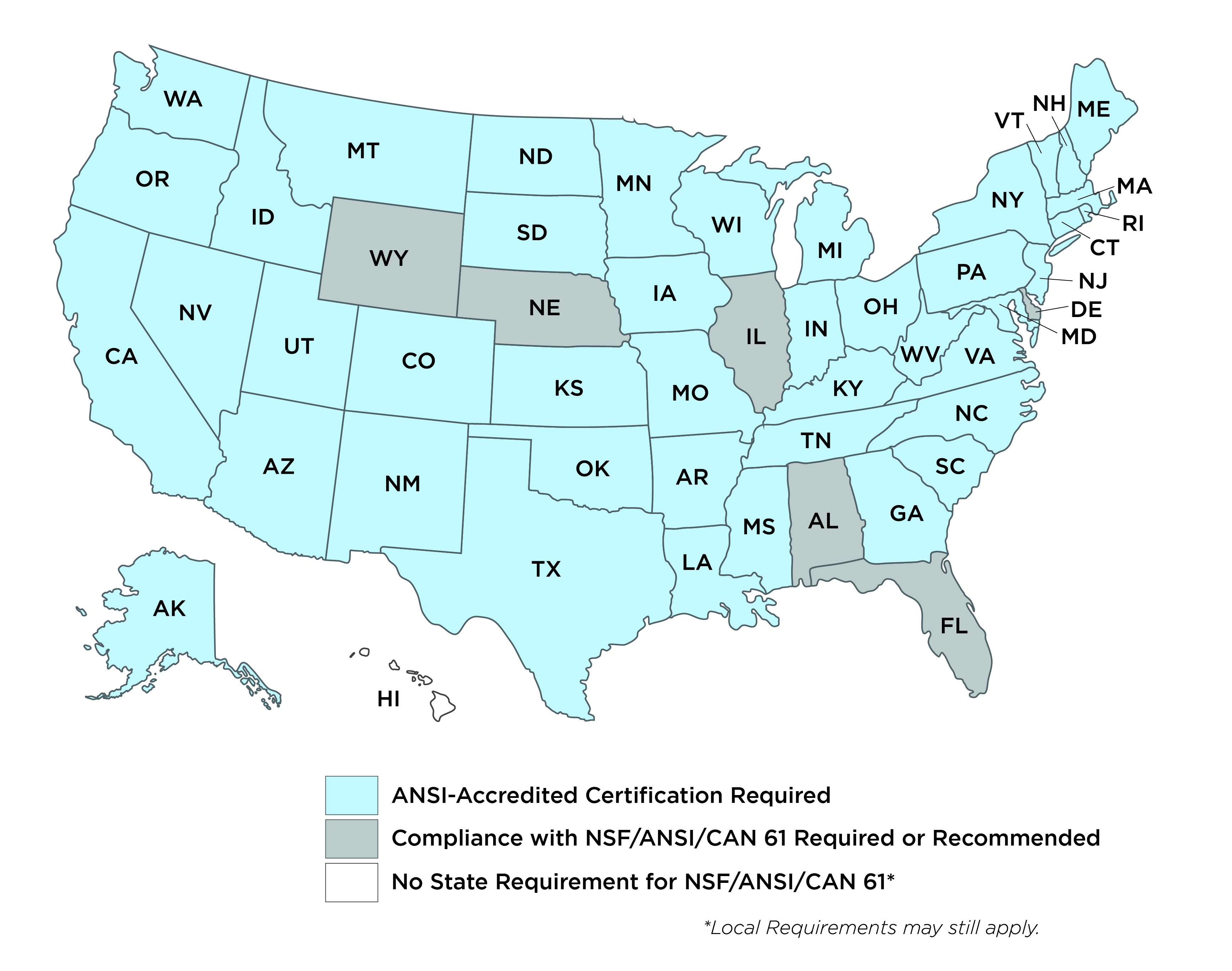
States requiring ANSI-accredited certification to NSF/ANSI/CAN 61 include: Alaska, Arizona, Arkansas, California, Colorado, Connecticut, Georgia, Idaho, Indiana, Iowa, Kansas, Kentucky, Louisiana, Maine, Maryland, Massachusetts, Michigan, Minnesota, Mississippi, Missouri, Montana, Nevada, New Hampshire, New Jersey, New Mexico, New York, North Carolina, North Dakota, Ohio, Oklahoma, Oregon, Pennsylvania, Rhode Island, South Carolina, South Dakota, Tennessee, Texas, Utah, Vermont, Virginia, Washington, West Virginia, Wisconsin
States where compliance with NSF/ANSI/CAN 61 is required or recommended: Alabama, Delaware, Florida, Illinois, Nebraska, Wyoming
No state requirement for NSF/ANSI/CAN 61 (local requirements may still apply): Hawaii
NSF/ANSI/CAN 60 Canadian Compliance Requirements
Health Canada conducted a survey of Canadian provincial and territorial drinking water agencies about their recognition and use of NSF/ANSI/CAN 60 and 61.
The survey found 9 of 13 provinces/territories require drinking water treatment chemicals to comply with the requirements of NSF/ANSI/CAN 60: Drinking Water Treatment Chemicals – Health Effects, as shown in the figure below. For more specific information regarding the requirements please refer to Addendum B.
As of April 2019, NSF/ANSI/CAN 60 is accepted as a National Standard of Canada by the Standards Council of Canada (SCC), but the previously published version has been widely recognized in Canada for years in the below locations.
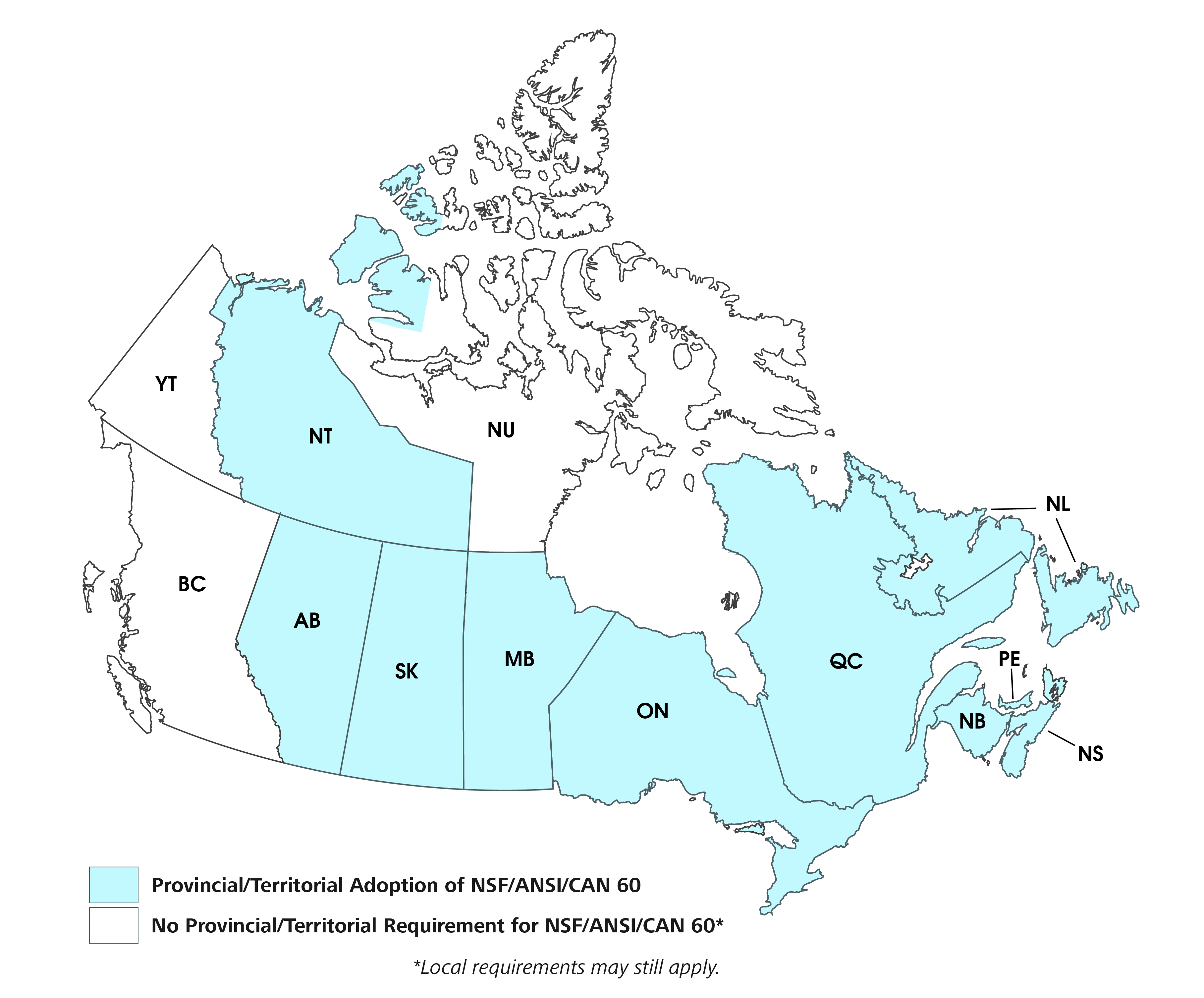
Provinces/territories with adoption of NSF/ANSI/CAN 60: Alberta, Manitoba, New Brunswick, Newfoundland, Northwest Territories, Nova Scotia, Ontario, Prince Edward Island, Quebec, Saskatchewan
Provinces/territories with no current adoption of NSF/ANSI/CAN 60: British Colombia, Nunavut, Yukon
NSF/ANSI/CAN 61 Canadian Compliance Requirements
In regard to NSF/ANSI/CAN 61, the survey found that 11 of 13 provinces/territories require drinking water system components to comply with the requirements of NSF/ANSI/CAN 61: Drinking Water System Components – Health Effects, as shown in the figure below. For more specific information regarding the requirements please refer to Addendum B. Plumbing products in buildings are regulated through the appropriate plumbing code in Canada.
Most products are required to comply with NSF/ANSI/CAN 61 via references in CSA standards that are referenced in the plumbing codes.
As of April 2019, NSF/ANSI/CAN 61 is accepted as a National Standard of Canada by the Standards Council of Canada (SCC), but the previously published version has been widely recognized in Canada for years in the below locations.

Provinces/territories with adoption of NSF/ANSI/CAN 61: Alberta, British Colombia, Manitoba, New Brunswick, Newfoundland, Northwest Territories, Nova Scotia, Ontario, Prince Edward Island, Quebec, Saskatchewan
Provinces/territories with no current adoption of NSF/ANSI/CAN 61: Nunavut, Yukon
Addendum A: ASDWA Member Survey on State Adoption of NSF-60 and NSF-61
State | State Adopted Legislation or Regulations | State Citation | ANSI-Accredited Certifier Required | Effective Date of Regulation and Latest Update - NSF-60 | Effective Date of Regulation and Latest Update - NSF-61 | |
|---|---|---|---|---|---|---|
| Alabama | Yes | 335-7-6.12/8.04 | Yes (NSF-60) | November 9, 1992 | November 9, 1992 | |
| Alaska | Yes | 18 AAC 80.030 | Yes | May 18, 1994 | May 18, 1994 | |
| Arizona | Yes 1 | AAC R18-4-213 | Yes | January 1, 1993 | January 1, 1993 | |
| Arkansas | Yes | PWS Reg. VII.F | Yes (policy) | October 1, 1994 | October 1, 1994 | |
| California | Yes 2 | CCR Title 22: 64590/64591 | Yes 2 | January 1, 1994 | March 9, 2008 | |
| Colorado | Policy | Yes (policy) | ||||
| Connecticut | Policy | Guidelines IV.D.5 | Yes | |||
| Delaware 6 | Yes | PWS Reg. 2.11.1.1 | No 3 | August 11, 1999 | August 11, 1999 | |
| Florida | Yes | 62-555.320(3) +.322© FAC | No | January 1, 1993 | January 1, 1993, January 1, 1994 4 | |
| Georgia | Yes | Rules 391-3-5 | Yes | July, 1992 | July, 1992 | |
| Hawaii | Yes 5 | HAR 11-20-38 | Yes | September 7, 1999 | ||
| Idaho | Yes | 58.01.08.501.01, 58.01.08.510.02 | Yes | October 1, 1993 | October 1, 1993 | |
| Illinois 6 | Policy 6 | |||||
| Indiana 6 | Yes | 327IAC 8-1-2 | Yes | May 1, 1999 | May 1, 1999 | |
| Iowa 6 | Yes | 41.4 (3) b;, 43.3 (8) | Yes | October 1, 2000 | August 11, 1999 | |
| Kansas | Policy 7 | Yes (policy) | ||||
| Kentucky | Policy | Yes (policy) | ||||
| Louisiana | Yes | Title 51 Sections 303.F, 335.C, 415.C.1 | Yes | April 2013 | ||
| Maine | Yes | 10-144-231, Sec 3 F.7, 8 | Yes | July 1, 2008 | July 1, 2008 | |
| Maryland | Yes | COMAR 26.04.01.33 | Yes 8 | December, 1992 | December, 1992 | |
| Massachusetts 9 | Yes | 310 CMR, 22.04(8) | Yes | November, 1992 | November, 1992 | |
| Michigan 6 | Yes | MI SDWA, 325.1013, +325.12102 | Yes | Yes | September 16, 1993 | September 16, 1993 |
| Minnesota 6 | Policy | Yes (policy) | ||||
| Mississippi | Policy | Yes (policy) | ||||
| Missouri 6 | Yes | 10 CSR 60 | Yes | April, 1992 | April, 1992 | |
| Montana | Yes | ARM 17.38:101 | Yes | September, 1992 | September, 1992 | |
| Nebraska 6 | Policy | Title 179, NAC 7 | ||||
| Nevada | Yes | NAC 445A.6663 | Yes | February, 1997 | February, 1997 | |
| New Hampshire | Yes | Env-Ws 305 | Yes | June, 1997 | June, 1997 | |
| New Jersey | Yes | NJAC 7:10-8 | Yes | June, 1997 | June, 1997 | |
| New Mexico* | Yes | WSR, 20.7.10.400K | Yes | July, 1992, Revised 2007 | July, 1992, Revised 2007 | |
| New York 6 | Policy | Yes (policy) | July, 1993 | July, 1993 | ||
| North Carolina | Yes | 15A NCAC 18c, .1537 | Yes | July 1, 1994 | July 1, 1994 | |
| North Dakota | Yes | NDAC 33-17-01-19.4 | Yes | January 31, 1997 | January 31, 1997 | |
| Ohio 6 | OAC 3745-83- 01(d) | Yes | Revised April 21, 2001 | Revised April 21, 2001 | ||
| Oklahoma | Yes | OAC 252:626-11.1 + 19.1 | Yes (policy) | Update effective June 1, 2003 | Update effective June 1, 2003 | |
| Oregon | Yes | 333-61-0087(05)&(06) | Yes (policy) | November 13, 1989 | November 13, 1989 | |
| Pennsylvania 6 | Yes | 25 PA Code, 109.606 | Yes | October 8, 1994 | October 8, 1994 | |
| Rhode Island 6 | Yes | DWQ 4613, 4.1A | Yes | January, 1993 | January, 1993 | |
| South Carolina 6 | Yes | R.61-58.2 (B), 4& (E) 3 | Yes | July 28, 1995 | July 28, 1995 | |
| South Dakota | Policy | Yes (policy) | ||||
| Tennessee | Yes | 1200-5-1-.17(36) | Yes | January, 1995 | January, 1995 | |
| Texas | Yes | TAC 290 42(j), 43 (c) (8), 44 (a) (1,2), 44 (i) (2) (B/H) | Yes | January 1, 1993 | January 1, 1993 | |
| Utah | Yes | R 309-105-10(1)(a)/10(2)(c) | Yes | July, 1989 | July, 1989 | |
| Vermont | Yes | VWSR Ch. 21, App. A 5.2.2 | Yes | September 24, 1992 | September 24, 1992 | |
| Virginia | Yes | 12 VAC 5-590-860 & 1110 | Yes | November 15, 1995 | November 15, 1995 | |
| Washington | Yes | WAC-246-290-220 | Yes | April, 1999 | April, 1999 | |
| West Virginia | Yes | 64 CFR 77 | Yes | July, 2000 | July, 2000 | |
| Wyoming | Policy 10 |
1 AZ: Legislation revised 7/96 to allow exceptions where NSF/ANSI/CAN 60 and/or 61 materials and equipment not available.
2 CA: Requires annual testing and inspections for ANSI-accredited certification of treatment chemicals to NSF/ANSI/CAN 60.
3 DE: Uses NSF list or equivalent guide but is not required for compounds not listed under either standard.
4 FL 1993 is for coatings and chemicals. 1994 is for other components.
5 HI: Adopted for NSF/ANSI/CAN 60; Legislation for NSF/ANSI/CAN 61, section 9 signed May 2, 2001.
6 State policy or regulations reference the “10 State Standards for Water Works” which references NSF/ANSI/CAN 60 for treatment chemicals and NSF/ANSI/CAN 61 for certain water treatment and distribution products.
7 KS: K.A.R. 28-15-18 (h) authorizes approval of treatment chemicals and protective coatings exposed to water for public consumption. KS has no regulations specifically for NSF/ANSI/CAN 60 or 61.
8 MD: Also accepts third-party certifications.
9 MA: Also requires maximum lead content of 3 percent in brass products.
6 State policy or regulations reference the “10 State Standards for Water Works” which references NSF/ANSI/CAN 60 for treatment chemicals and NSF/ANSI/CAN 61 for certain water treatment and distribution products.
10 WY: Recommends use of the standards. Cannot require because state does not have primacy for drinking water regulations.
Addendum B: Health Canada Survey on Provincial/Territorial Adoption of NSF-60 and NSF-61
Province | Intend To Use NSF-60 | Intend To Use NSF-61 | Adopted Legislation | Provincial Citation | SCC-Accredited Certifier Required / Recommended | Date in Place - NSF-60 | Date in Place - NSF-61 | Effective Date - NSF-60 | Effective Date - NSF-61 | Additional Evaluation Required |
|---|---|---|---|---|---|---|---|---|---|---|
| British Columbia 2 | No | Yes | Policy | Policy through construction approval | ||||||
| Alberta | Yes | Yes | Yes | Potable Water Reg: Sect 8(1)(b) | Yes | Sept 2003 | Sept 2003 | Sept 2003 | Sept 2003 | No |
| Sask. | Yes | Yes 6 | Leg. for NSF-60 Permit to Operate / Construct for NSF-61* | The Water Regulations, 2002; Subsections 30(1) and (2) | No | Dec 5, 2002 | Permits since Dec 5, 2002 | Dec 5, 2002 | Permits since Dec 5, 2002 | No |
| Manitoba | Yes | Yes | Policy | |||||||
| Ontario | Yes | Yes | Certificate of Approval | Safe Drinking Water Act, 2002, S.O. 2002, c. 32, sec. 40 | Yes | 1996 | 1996 | N/A | N/A | No |
| Quebec | Yes | Yes | Guidance Document | Guide de conception des installations de production d'eau potable | Yes | 2001 | 2001 | 2001 | 2001 | No |
| New Brunswick | Yes | Yes | Policy | Certificate of Approval to Operate Public Water System under the Clean Water Act | 2004 | 2004 | 2004 | 2004 | No | |
| Prince Edward Island | No | Yes | Yes | Water Well Regulations Section 25 | No | March 2003 | March 24, 2003 | No | ||
| Nova Scotia | Yes | Yes | Approval to Operate | Activities Designation Regulations: Sec. 66, Environment Act S.N.S. 1994-95, c. 1 O.I.C. 95-286 (April 11, 1995), N.S. Reg. 47/95 as amended by O.I.C. 2005-257 (June17, 2005), N.S. Reg. 128/2005 | Yes | March 2003 | March 2003 | March 2003 | March 2003 | No |
| Newfoundland and Labrador | Yes | Yes | Policy | Permits to Operate Water Resources Act, Section 37 | Yes | June 2003 | June 2003 | June 2003 | June 2003 | No |
| Yukon Territories | No | No | No | N/A | N/A | N/A | N/A | Yukon Territories | No | No |
| Northwest Territories | Yes | Yes | Policy | No | ||||||
| Nunavut | No | No | No |
1 The main survey conducted in April 2014, but this document is updated regularly with new information
2 Last updated in September 2006.
How NSF Can Help You
Get in touch to find out how we can help you and your business thrive.

What’s New with NSF

NSF Granted Reauthorization as a CMMC Third-Party Assessment Organization
January 8, 2025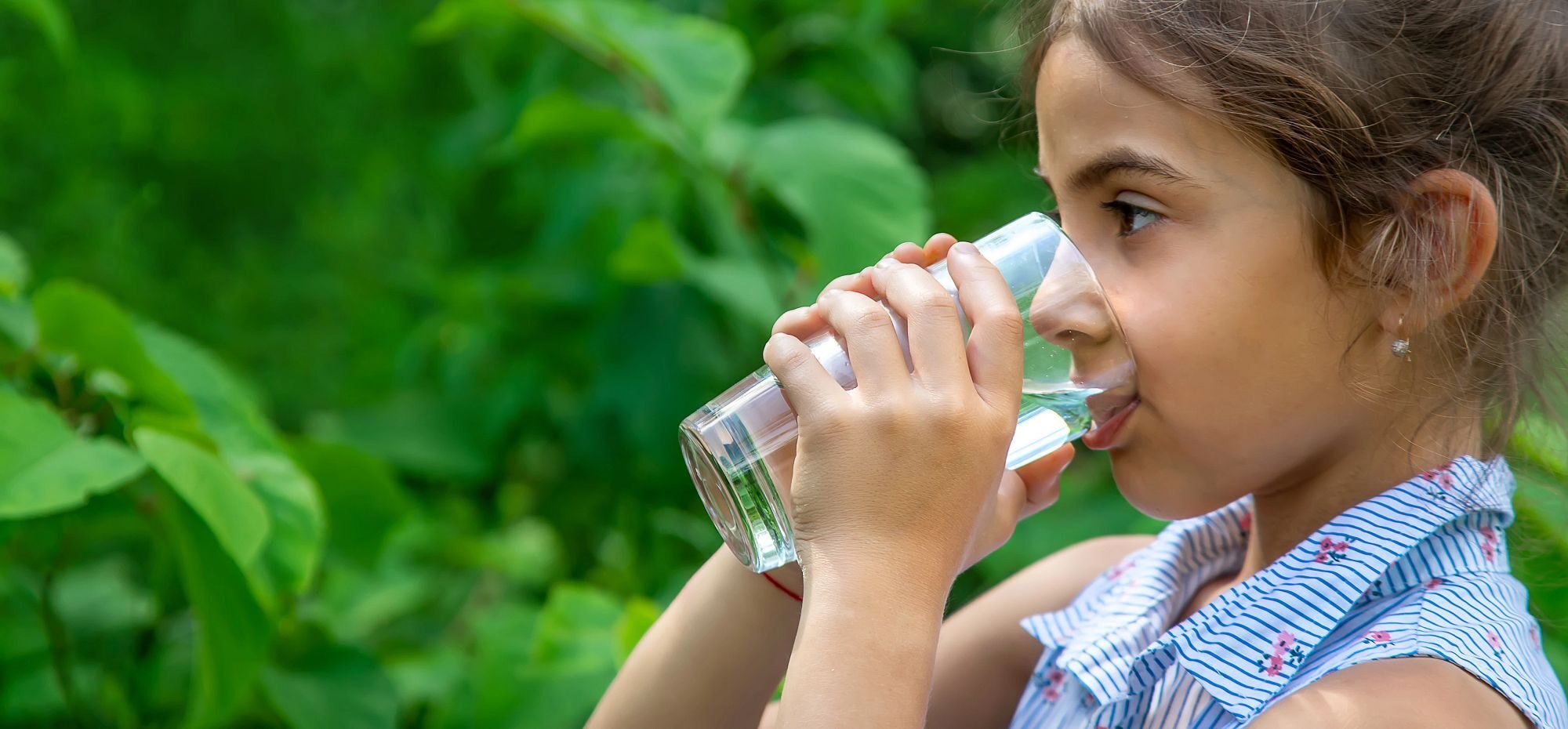
NSF Celebrates 50 Years of the Safe Drinking Water Act
December 16, 2024